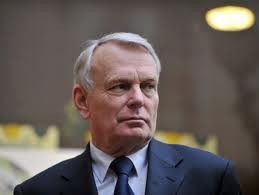(VOVworld) – The first cabinet meeting chaired by new French Prime Minister Jean Marc Ayrault took place on Thursday, May 17th. Nominated as Prime Minister right after President Francois Hollande took office, Ayrault, a close aide of Hollande, is expected to play a key role in helping Hollande realize his election commitments and meet the challenges of his presidential term.
Before the new cabinet made its debut, Ayrault and Hollande spent 4 hours discussing government posts. Of the 34 ministerial posts, 17 were given to women, just as Hollande promised during his campaign. The top appointments include former Prime Minister Laurent Fabius as foreign minister. Hollande's campaign director and one-time European Affairs Minister Pierre Moscovici was named finance minister. Speaking on France 2 TV, the newly appointed Prime Minister declared that the government has been profoundly reorganized, reflecting changes the French public wants.
 |
| French new Prime Minister Jean Marc Ayrault |
A special adviser to Ollande during his presidential campaign, Ayrault shares the President’s viewpoints on many issues, including an internal unity, national reconciliation, economic recovery, and resolving the regional crisis.
Ayrault has a reputation as a calm consensus-builder and moderate. In 1977, he became France’s youngest Mayor in Saint Herblain, a city with a population of 30,000. Ayrault was elected to the Parliament in 1986, became the Mayor of Nantes in 1989, and since then has served Nantes either as Mayor or member of Parliament. The relationship between Hollande and Ayrault was established in 1997 when Hollande became the leader of the Socialist Party. Analysts say Hollande can rely on Ayrault because he thoroughly understands how the parliament works. Fluent in German and enjoying close relationships with many German leaders, Ayrault can help Hollande smooth out the differences between Paris and Berlin in resolving the European public debt crisis.
During his 5 years in office, former Preisdent Nicolas Sakorzy did not have much success overcoming enormous public debt, a high unemployment rate, stagnant growth, and social unrest. In 2011, France’s state budget deficit was 5.2% of GDP. In his promises to voters, Hollande vowed to create a roadmap for economic recovery, reduce the salaries of France’s President and cabinet members 30%, write a Charter on professional ethics for cabinet members, increase allowances for students 25%, generate jobs for young people, and fight social inequality.
Obviously, the challenges facing the new French government will require consensus within the cabinet. The public is hoping this fresh start will produce some needed changes.